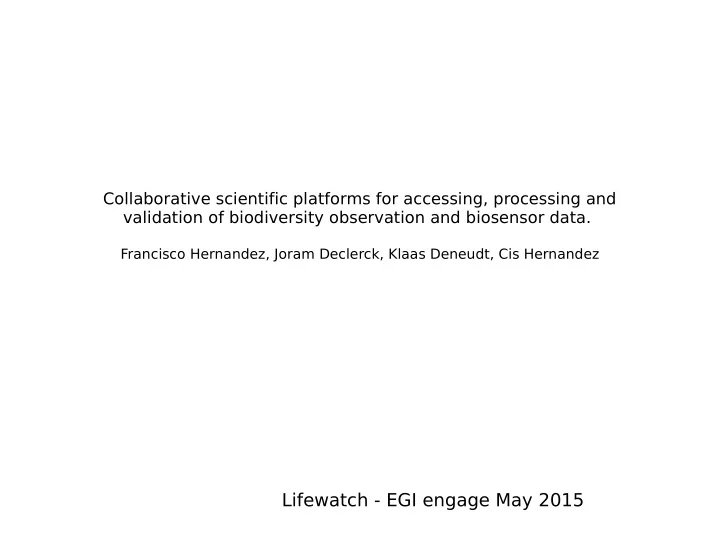

Collaborative scientific platforms for accessing, processing and validation of biodiversity observation and biosensor data. Francisco Hernandez, Joram Declerck, Klaas Deneudt, Cis Hernandez Lifewatch - EGI engage May 2015
Outline • Lifewatch • EGI - ENGAGE – Collaborative scientific platform – Biosensors – Challenges – Status – Virtual labs and research environments • Progress
Lifewatch infrastructure • European research infrastructure, ESFRI roadmap • Study of biodiversity and ecosystems • Access to realtime data • Biosensor networks • BIG data, inline data processing • More info : http://www.lifewatch.eu • Example VRE : http://marine.lifewatch.eu/ • Belgian contribution: http://www.lifewatch.be
Biosensors • Biological sensors that enable observations at space and time scales relevant to organisms behavior, physiology and life history – Optics, Acoustics, Genetics, GPS • Discrete => continuous • Delayed mode => real-time
http://www.lifewatch.be/en/sensors
Zooscan • High resolution flatbed scanner for water samples • Digital storage and processing of zooplankton samples -> taxonomic composition and abundance • Image acquisition: 2400-4800 dpi • Data generation: +/- 4 GB/sample; 432 Gb/year • Analysis: pattern recognition software (Plankton Identifier [T anagra], ZooImage [R], …)
Video Plankton Recorder (VPR) • Real-time underwater digital camera system + strobe • Rapid quantification of plankton taxonomic composition and abundance • Image acquisition: 30 frames/second of 7.2 ml image volume • Data generation: +/- 10GB/h (at 150kb/image) , 1.5M files / h • Analysis: pattern recognition software (Visual Plankton software [Matlab])
Flow cytometer • Laser based instrument for particle detection and characterisation in fluids • Counting and characterisation of phytoplankton particles -> taxonomic composition and abundance Image acquisition: particle scattering + fluorescence • • Data generation: +/- 200 MB/sample; 1Tb/year Analysis: clustering software (Easyclus [Matlab], FCM [R], • …)
Acoustic fish telemetry • Acoustic fish tag tracking Studying distribution, migration and habitat use • • Data generation: 25 MB/month Analysis: GIS mapping & visualization (CartoDB), behaviour • analysis (Matlab, Python)
Multibeam echosounder • Acoustic high resolution depth sounding sonar Bathymetry and sediment typology • • Data generation: sediment 10Gb; water column 100Gb/day Analysis: data cleaning and validation, chart creation, • deriving sediment typology (CARIS, Fledermaus)
Sediment profiler imaging • Digital Sediment Profiling Camera Vertical cross section of the sediment/water interface • • Image acquisition: 24.1 Mpixel images of 320 cm2 of sediment • Data generation: 1Gb/image; 130 Gb/year • Analysis: Image pattern recogition software, relating to benthic communities
Acoustic bat recorder • Ultrasound detection and recording Sound acquisition: 500 kHz with 16 Bit amplitude resolution • • Data generation: 1 MB/per second of sound recording; 0.5 Gb/night • Analysis: Call detection and recogition software
Bird tracking with GPS • Tracking of large birds with GPS tags developed by UvA-BiTS Studying migration and habitat use • • GPS position every 10min, 70 birds, soon > 100 Data generation: 3G/year (Flemish LifeWatch), multiple • GB/year (UvA-BiTS) • Analysis: GIS mapping & visualization, behaviour analysis (Matlab,Python,R)
Challenges • Biosensor – buy and install equipment: sensors, winches, antennas – technical calibration, raw signal processing, vendor softw. • IT – real-time data transfer, storage, processing • Biology – sensor output -> biodiversity parameters – aggregating, combine data, models & predictions, visualization, sharing, validation,…
Doctoral studies on sensor use and application 4 PhD’s at Ghent University - - Started October 2014 - Work on : Standard operation procedures - - Algorithms for translation of sensor output to biodiversity parameters on abundance and distribution of taxa - Recommendations on optimization and upgrade of the infrastructure Applications of the infrastructure in biodiversity and - ecosystem studies
Collaborative platform for sensor data processing and analysis Sensor network Processing network Science community Flowcytometer eDNA Scripts, workflows, VPR Calibration Bird Radar algorithms Sensor data data Benthic img Fish sonar ? LW ICT core Rsyn Species identifications, Remote sensing c field observations, FedCloud crowd sourcing Hydrophon Bird video R, Java, es Postgis, Python, Geoserver Rstudio, Rshiny In situ habitat obs. Bird tracks Fish tags ? Scientific data Archive
Infrastructure Status Bird GPS tracking 3 base stations installed and operational network + web 70 birds with GPS cams Flow Cytometer Installed on RV Simon Stevin and operational Multi beam Installed on RV Simon Stevin and operational Acoustic bat T est installation installed. Offshore installation in detectors preparation ZooScan Installed in MSO lab and operational Video Plankton T o be installed July 2014 Recorder Sediment Profile Installed on RV Simon Stevin and operational Imaging Acoustic fish 40 fishes tagged, 51 receivers installed, data for telemetry >2 years
mongoDB network
File management
Progress • Ongoing testing with ICT Core facilities: IFCA, EGI ENGAGE • Create virtual servers – on fedcloud : problem with OCCI – on IFCA / LW servers : on going / tickets – R, R studio server, Rshiny : at VLIZ – PostGIS, geoserver : at VLIZ • Set up data transfer – from ship & stations to IFCA : daily Rsync operational – from VLIZ geoserver to IFCA – manage storage capacity • Set up user interfaces for scientists – VLIZ users : started – external users – manage resources: user data, algorithms, scripts, models, …
Lifewatch virtual labs to ICT core Meeting in Amsterdam • Collect and present existing virtual labs • – Lifewatch Marine Virtual Research Environment (VRE) : done – VRE for terrestrial & other thems: started • Upscale virtual lab components using LW ICT core – Environmental layers, Species occurence data – BIOVEL portal , Biodiversity catalogue – T axonomic, Biostatical & Modelling webservices http://marine.lifewatch.eu/
More info • Lifewatch website http://www.lifewatch.eu • Marine VRE : http://marine.lifewatch.eu/ • Belgian contribution: http://www.lifewatch.be • Flanders Marine Institute : http://www.vliz.be
Recommend
More recommend